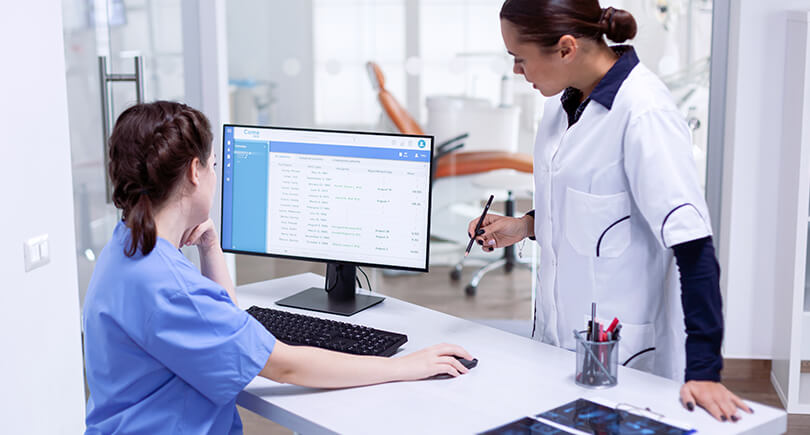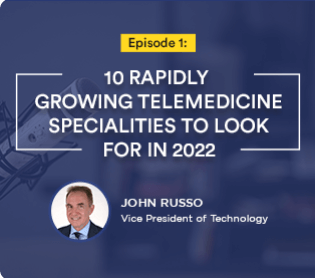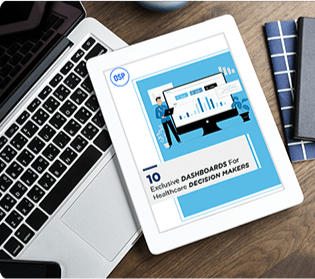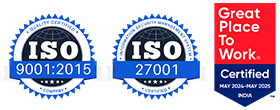Like every business, a physician practice must also deal with day-to-day workflows to manage its operations. While the practice goal is healthcare, it must also handle routine office administration that involves billing, payments, payroll, utility bills, etc. Doing these activities with pen and paper takes longer, increases labor, and makes it prone to mistakes.
How Can Healthcare Practice Management Systems Help?
As mentioned above, there are a lot of administrative activities to be done in medical practice. Errors in filing claims, medical coding, patient data entry could result in lost revenue and affect the delivery of care. However, providers can cut back on labor costs using a practice management healthcare platform by streamlining all the non-clinical tasks on a digital interface.
This minimizes the chances of errors, speeds up workflows, optimizes financial management, and leaves more time for doctors to see patients. To sum it up, using practice management systems in healthcare benefits the patients, doctors, the medical staff, and the payers.
If you’re a medical professional looking for medical practice management software, it can get overwhelming as several vendors claim their software to be the best. Here are some of the main features in a healthcare practice management system that you need to consider
10 Features to Look For in a Healthcare Practice Management Software –
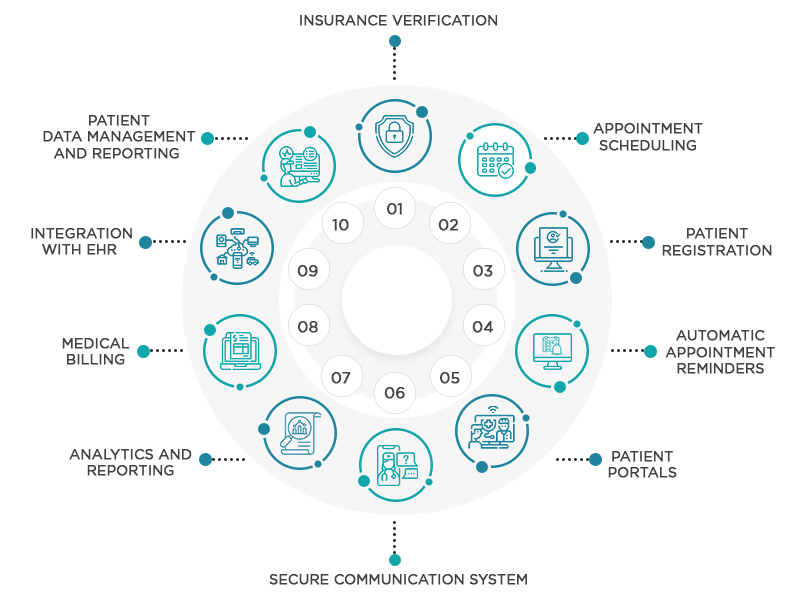
1. Insurance Verification
This is one of the most sought-after features in practice management solutions that clinical practitioners look for. This goes beyond mere storing and managing insurance information. Such functionality would verify the details of every patient’s insurance coverage. This is especially important because plans tend to be complicated and a rapid verification procedure lets you know if a patient has the necessary coverage for certain services.
In addition to this, insurance verification within a healthcare practice management software can also streamline the re-submission of claims. Every provider knows how long it can take to re-submit claims. A medical practice billing software that can automate insurance verification and claims re-submissions would improve revenue flows and patient experience.
2. Appointment Scheduling
An appointment scheduling feature in a health practice management platform significantly improves clinical efficiency. The ability to look for available slots, finalize timings, and even re-schedule appointments with a few clicks make things easier for physicians and non-medical staff.
The ability to re-schedule appointments without hassles has reduced missed consultations. No shows have been directly linked to worsening health for patients with chronic conditions. So, custom healthcare software solutions that include a scheduling feature within a medical practice software are a must-have for doctors.
3. Patient Registration
Pre-registering patients involves collecting and managing their personal and medical information during their first visit. The traditional way involved pen and paper and manual filing. On the other hand, a patient registration feature included within automated healthcare solutions to digitize patient registration helps aggregate the data better, making it easier to store and check for coverage details.
4. Automatic Appointment Reminders
Healthcare spending in the United States has topped $3 trillion. That’s more than the economy of all but four countries. Studies conclude that a major reason for that is poor management of chronic conditions, which happens because of missed appointments. Medical billing practice management solutions that include automatic appointment reminders reduce no-shows and encourage people to show up for consultations on time, in addition to medical practice management systems, numerous patient engagement systems to feature automated appointment reminders.
There could be many reasons for missed consultations – busy schedule, change of plans, or just plain forgetfulness. A physician might change a patient’s dosage, prescriptions, or even recommend tests in a follow-up appointment. Automated reminders in healthcare practice management software push people to take their health more seriously by preventing them from missing any consultations.
5. Patient Portals
Integrated healthcare solutions that include patient portals within medical billing practice management software have improved doctor-patient interaction. People can look at their medical information, insurance coverage details, pay bills, change prescriptions, and so forth on patient portals.
Moreover, recent adoptions of healthcare cloud computing technologies have allowed patient portals to be accessed from personal devices while on the move. This empowers patients to be better involved in their care and even make informed decisions.
6. Secure Communication System
Healthcare practice management software with a secure communication system allows seamless doctor-patient engagement. The communication could be through calls or messages. This will enable patients to speak with their clinician to resolve their medication, diet, or lifestyle queries.
Advanced telehealth solutions within healthcare practice management solutions allow patients to have virtual consultations from remote locations. Interactive patient-doctor communication is increasingly vital to the overall patient experience.
7. Analytics and Reporting
Analyzing operational data often reveals insights about running a business more efficiently. Analytics has helped every industry derive more revenue and cut down costs in day-to-day operations. Similarly, analytics and reporting within practice management for healthcare highlights where clinicians can improve the business side of their practice. Healthcare software product development that offers this feature helps providers aggregate administrative back-office work into a single dashboard. Moreover, they can have a bird’ eye view of their business information, which would show them where most of their money is being spent. As a result, clinicians can be better informed when deploying their resources and cut back wherever needed.
8. Medical Billing
The process of billing is what keeps the revenue flowing for providers. Healthcare practice management software that includes billing can help consolidate all billing activities into one interface. Verifying if a patient’s payer is supported by your practice, attesting claims, and handling payments are some of the benefits that a practice management software for healthcare can offer. A vendor offering PMS in medical billing also includes assessing claims and minimizing denials. So, a billing feature is an indispensable component of any healthcare practice management software. It generates greater revenue by cutting costs, improving workflows, optimizing care delivery, and improving overall health care management.
9. Integration with EHR
If a health practice management software can integrate with an EMR/EMR, it will facilitate faster electronic data interchange. Additionally, physicians can easily pull up patient data during consultations or tests to expedite the process of care delivery. An EHR within a PMS software for medical billing provides a central repository for storing healthcare data. Such integration will also facilitate remote health monitoring systems to keep track of patient health so that the EHR can be updated periodically. In the long run, such an arrangement can help doctors manage at-risk patients better. In other words, having electronic health records incorporated into a medical practice management service can have a transformative impact on the overall quality of care and clinical outcomes.
10. Patient Data Management and Reporting
An integrated patient data management and reporting module are one of the most coveted features within a healthcare practice management system. By helping physicians aggregate patient data, this feature facilitates medical informatics solutions to highlight clues about patient health.
Moreover, a patient data management system enables medical staff to view patients’ insurance coverage, payments, and outstanding bills on a single interface. In doing so, software for practice management in healthcare bolsters the efficiency of non-clinical work.
Conclusion
There are numerous healthcare practice management systems that clinicians can choose from. But the features mentioned above can help doctors improve the non-clinical aspect of their practice. This would enable them to reduce overhead, minimize the burden of their staff, lower waiting times for patients, and in doing so, improve the clinical outcomes. So remember to look out for these features if you’re having a hard time deciding on a healthcare practice management system software.
OSP is a trusted software development company that delivers bespoke solutions as per your business needs. Connect with us to hire the best talents in the industry to build enterprise-grade software.
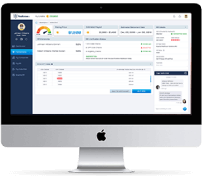
How can we help?
Fill out the short form below or call us at (888) 846-5382
Looking for software solutions to build your product?
Let's discuss your software solutions for your product in our free development acceleration call!
Get In Touch arrow_forwardDiscuss Your Project Handover with a team of expert Book a free consultation arrow_forward
About Author

Written by Riken Shah linkedin
Riken's work motto is to help healthcare providers use technological advancements to make healthcare easily accessible to all stakeholders, from providers to patients. Under his leadership and guidance, OSP Labs has successfully developed over 600 customized software solutions for 200+ healthcare clients across continents.







